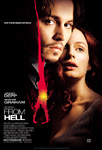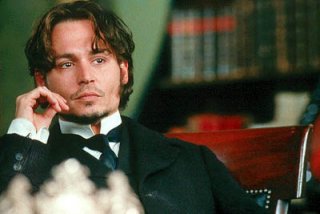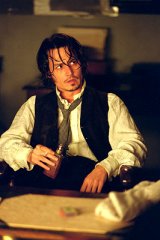|
From Hell
He may not have been the first serial killer, nor the most prolific, but Jack The Ripper may be the killer with the greatest hold on the popular imagination. All the more fun to imagine, in fact, because no one really knows who he was.
After extensive research, writer Alan Moore teamed up with artist Eddie Campbell to throw their fictionalized theory into the ring in a massive graphic novel called From Hell. Complex as a $500 bottle of wine, From Hell required no fewer than thirty pages (triple-columned) of footnotes and annotations. Despite its depth, Hollywood came calling.
In the hands of the Hughes Brothers (Albert and Allen), From Hell remains somewhat complex, though typical Hollywood trappings water it down. The resulting film may be more of a casual table wine, but it sure is fun to drink.
Johnny Depp stars as Inspector Fred Abberline, a detective prone to both psychic visions and a variety of mind-altering substances. (Sadly, his drinking absinthe does not conjure up Kylie Minogue.) For some reason, his partner Godley (Robbie Coltrane) takes Abberline's visions at face value, the only person in Scotland Yard who does. The two have been called in to solve a prostitute's murder in the East End. By accent and allusion, it becomes clear that Abberline knows those streets too well for his own liking.
As to who is committing these murders, and why, the Hughes Brothers do a good job of hiding their clues in plain sight. The graphic novel lets the reader in on it immediately; wisely, the film makes it a mystery for the sharp viewer to solve with Abberline. We do know it has something to do with high society, but the true motive takes awhile to glean. Loaded with red herrings (historical but likely fictionalized) and obscure slices of 1888 London life, something is always happening onscreen to cleverly (but fairly) misdirect the audience.
All that can be said for sure is that the killer has focused on a specific group of prostitutes, led by Mary Kelly (Heather Graham, with a slightly distracting red dye-job). Sometimes known as Marie, sometimes as Jeanette, Mary has a somewhat tarnished heart of gold. Though all the "unfortunate women" do know something dangerous, they themselves do not know what it is. And despite Abberline's request that they stay off the streets, the reality of their lives prevents them from taking the very actions that would save them.
After Abberline and Mary meet, things do wallow a bit in Hollywood treacle. Their romance is chaste, but feels a little forced by genre habit. It does, however, end with surprising poignancy, once the directors connect dots left in place by the graphic novel.
The scope of the source material requires a broad canvas. To their credit, the Hughes Brothers have not flinched away from that. Though some people and places appear without a sense of why they might be important ("hey look! It's that freaky Elephant Man!"), it is clear these murders did not happen in a vacuum.
With no little sad irony in 2001, the Hughes show us casually ugly attitudes of class and race; a couple of scenes could substitute the word "Muslim" for "Jew" and easily be timely. In quick seemingly throwaway strokes, the directors present us with the popular theories of the day. You have to be quick to take it all in, or, more insidiously, you have to see it more than once.
Helping the Hughes is a rich cast of British character actors. Ian Richardson stands out as Sir Charles Warren, Abberline's superior on the case. He plays his character's ineffectiveness in such a way that you never really know if it's an act or not.
Making his first big foray outside of a Guy Ritchie film, Jason Flemyng impresses as Netley, the "chauffer" for Jack The Ripper, torn between a sense of duty and a sense of damnation. And though too much goes on for the prostitutes to be deeply fleshed-out characters, each actress still manages to be memorable. The weakest may be the biggest star, Graham, with an unsteady accent but an unwavering stare. It's a stretch for her that her talent cannot yet reach.
The film belongs, however, to the antagonists of Depp and the actor playing Jack The Ripper. If Depp has ever given an uninteresting performance, it has never been filmed. Always magnetic, he does a convincing job as a man trying desperately to run from demons even as he surely tracks one down. Without compromising the mystery, let it be said that when Jack's identity is revealed, the actor playing him rises to an impressively terrible majesty.
On an atmospheric level, too, the Hughes have made an impressive picture. Filmed in Prague rather than London, Whitechapel has been painstakingly recreated. What could not be built has been done in computer graphics, and the only times the seams show are when it's intentional. Abberline's dreams spill into crimson skies over London, and though the Hughes are not exactly Lynchian masters of hallucination, they may get there.
They have, however, done a creditable job as Hitchcock imitators. Most of the violence is filmed tastefully, implying more than is actually shown (like Psycho, your mind will be convinced it saw far more than it did). What little gore does appear onscreen is historically accurate, a sad reminder that the greatest monsters are still ourselves.
It may seem a bit clichéd, but this is a movie that will make you want to find out more about its subject. You can visit your local library, or you can start with the graphic novel. In either case, you won't be sorry.
What's It Worth? $8.50















